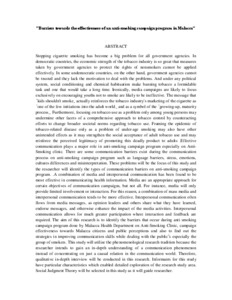Citation
Abdullah, Siti Faidul Maisarah and Ilyas, Ilya Yasnorizar and Mohd Ashraff, Noor Ashmalia
(2016)
"Barriers towards the effectiveness of an anti-smoking campaign program in Malacca".
Journal of Education and Social Sciences, 3.
pp. 99-105.
ISSN 2289-9855
Abstract
Stopping cigarette smoking has become a big problem for all government agencies. In democratic countries, the economic strength of the tobacco industry is so great that measures taken by government agencies to protect the rights of nonsmokers cannot be applied effectively. In some undemocratic countries, on the other hand, government agencies cannot be trusted and they lack the motivation to deal with the problems. And under any political system, social conditioning and chemical habituation make banning tobacco a formidable task and one that would take a long time. Ironically, media campaigns are likely to focus exclusively on encouraging youths not to smoke are likely to be ineffective. The message that “kids shouldn't smoke” actually reinforces the tobacco industry's marketing of the cigarette as “one of the few initiations into the adult world” and as a symbol of the “growing-up, maturity process”. Furthermore, focusing on tobacco use as a problem only among young persons may undermine other facets of a comprehensive approach to tobacco control by counteracting efforts to change broader societal norms regarding tobacco use. Framing the epidemic of tobacco-related disease only as a problem of under-age smoking may also have other unintended effects as it may strengthen the social acceptance of adult tobacco use and may reinforce the perceived legitimacy of promoting this deadly product to adults .Effective communication plays a major role in anti-smoking campaign program especially on Anti-Smoking clinic. There are some communication barriers exist during the communication process on anti-smoking campaign program such as language barriers, stress, emotions, cultures differences and misinterpretation. These problems will be the focus of this study and the researcher will identify the types of communication barriers on anti-smoking campaign program. .A combination of media and interpersonal communication has been found to be most effective in communicating health information. Media are an appropriate approach for certain objectives of communication campaigns, but not all. For instance, media will only provide limited involvement or interaction. For this reason, a combination of mass media and interpersonal communication tends to be more effective. Interpersonal communication often flows from media messages, as opinion leaders and others share what they have learned, endorse messages, and otherwise enhance the impact of the media activities. Interpersonal communication allows for much greater participation where interaction and feedback are required. The aim of this research is to identify the barriers that occur during anti smoking campaign program done by Malacca Health Department on Anti-Smoking Clinic, campaign effectiveness towards Malacca citizens and public perceptions and also to find out the strategies in improving communication skills while dealing with the public’s especially the group of smokers. This study will utilize the phenomenological research tradition because the researcher intends to gain an in-depth understanding of a communication phenomenon instead of concentrating on just a causal relation in the communication world. Therefore, qualitative in-depth interview will be conducted in this research. Informants for this study have particular characteristics which enabled detailed exploration of the research study area. Social Judgment Theory will be selected in this study as it will guide researcher.
Download File
![[img]](http://psasir.upm.edu.my/63984/1.hassmallThumbnailVersion/Barriers%20towards%20the%20effectiveness%20of%20an%20anti-smoking%20campaign%20program%20in%20Malacca.pdf)  Preview |
|
Text (Abstract)
Barriers towards the effectiveness of an anti-smoking campaign program in Malacca.pdf
Download (53kB)
| Preview
|
|
Additional Metadata
Actions (login required)
 |
View Item |

